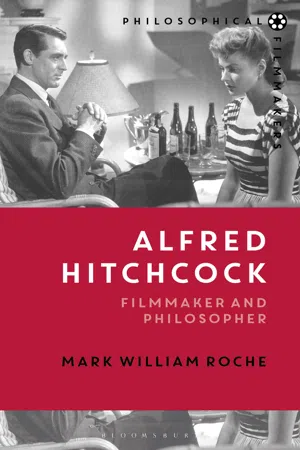
- 216 pages
- English
- PDF
- Available on iOS & Android
About this book
Hitchcock was a masterful director, popular with audiences of all ages and critically acclaimed both during and after his unusually long career. What may have been sensed by many viewers but not fully articulated until now is the extent to which his works subtly engage philosophical themes: What is evil, and how does it shield and reveal itself? Can we know what is inside the mind of another person? What is at stake when one knows the truth but cannot speak of it or cannot persuade others? How is Hitchcock's loving critique of humanity manifested in his films? Why are Hitchcock's works so often ambiguous? What is the hidden purpose and theory behind his use of humor? Hitchcock employs cinematic techniques–from camera angles and use of light to editing and sound–partly to convey suspense and drama but also to engage and advance philosophical issues, ranging from identity crises to moral ugliness. Roche unlocks Hitchcock's engagement with philosophical themes, and he does so in a way that appeals to both the novice and the seasoned philosopher, as well as enthusiastic admirers of Hitchcock's films.
Frequently asked questions
- Essential is ideal for learners and professionals who enjoy exploring a wide range of subjects. Access the Essential Library with 800,000+ trusted titles and best-sellers across business, personal growth, and the humanities. Includes unlimited reading time and Standard Read Aloud voice.
- Complete: Perfect for advanced learners and researchers needing full, unrestricted access. Unlock 1.4M+ books across hundreds of subjects, including academic and specialized titles. The Complete Plan also includes advanced features like Premium Read Aloud and Research Assistant.
Please note we cannot support devices running on iOS 13 and Android 7 or earlier. Learn more about using the app.
Information
Table of contents
- Cover
- Half Title
- Series
- Title
- Copyright
- Dedication
- Contents
- Figures
- Acknowledgments
- Introduction
- Chapter 1 Hitchcock’s Philosophical Universe
- Chapter 2 Hitchcock as a Master of Form
- Chapter 3 Ambiguities in Shadow of a Doubt
- Chapter 4 Hitchcock’s Real and Apparent Gaps
- Chapter 5 Hitchcock and Beyond
- Notes
- Credits
- Works Cited
- Index